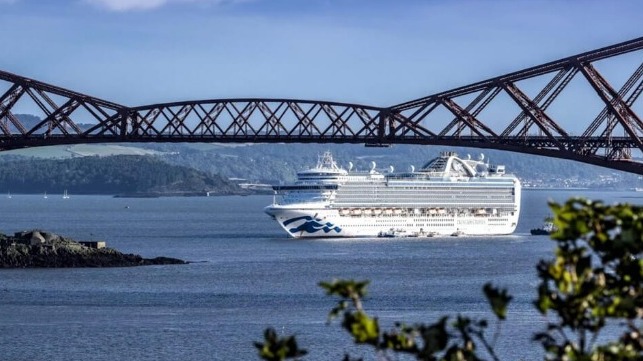Scottish Politicians Call for Cruise Ships Fees to Manage Industry Growth

After a record year for the number of cruise ship visits and passengers in many of Scotland’s ports, leaders from one of the political parties outlined plans last weekend to introduce new fees aimed at helping to deal with the waves of tourists. They said the plan would also encourage cruise lines to switch to zero-emission shipping.
Scotland like many destinations is experiencing a rapid resurgence in cruising after the pandemic. At the beginning of this year’s season, Forth Ports which operates some of the key ports said it was expecting a 50 percent increase in its cruise business with at least 150 cruise ship visits, up from 100 in 2022 at the ports of Edinburgh, Fife and Dundee. The industry trade group Cruise Scotland is reporting that more than one million cruise passengers were expected in 2023 up from around 800,000 in 2019.
The increase in visits was not limited to the largest ports near the Scottish capital region, with smaller ones such as Dundee reporting it would go from four cruise ship calls in 2022 to 14 this year. As the season wound down in October, the Lerwick Port Authority, for example, called 2023 a year “like no other,” citing a record 129 cruise ship visits with more than 124,000 passengers.
By all expectations, 2024 will continue to see strong growth. Officials at the port of Aberdeen, for example, reported they have already booked 55 calls for 2024 up from 43 this year, and that they are receiving inquiries for 2025 and 2026. While these visits provide a strong boost to many local businesses and create new business opportunities, the ports and city officials also need to manage the strong influx of people coming from the cruise ships and deal with complaints from residents for everything from traffic to noise and trash.
“We will work with our partners in local government to empower councils to charge visiting cruise ships a levy,” said party co-leader Lorna Slater speaking at the Scottish Green Party’ policy conference last weekend. “It will mean communities hosting cruise ships get the investment they deserve,” said Ms. Slater, noting “Our aim would also be to encourage greener ships.”
No specific details were announced on the amount of the so called levy or how it would be administered as the decisions would be with the local government. However, they were indicating support at the national level to take steps to address the pressures created on the ports and surrounding communities.
“From Ullapool to Greenock, Kirkwall to Edinburgh, Stornoway to Rosyth, and many more besides, this will make a massive difference in supporting communities,” said Scottish Greens transport and environment spokesperson Mark Ruskell. “For all the benefits tourism brings, pressure on infrastructure, services and how lives of locals in port areas are impacted need properly targeted help and this helps.”

that matters most
Get the latest maritime news delivered to your inbox daily.
The moves to introduce new fees in Scotland comes as other destinations in Europe are also working to manage the influx of cruise ships and the ever-increasing numbers of passengers. Both Amsterdam in the Netherlands and Barcelona, Spain launched efforts to remove cruise ships from their city centers citing the emissions and challenges on the port infrastructure. Smaller destinations such as Orkney are also moving to limit cruise ships. The Orkney Council approved a plan last month to limit the number of cruise ships to one in port at a time. It was seen as a compromise move to support the tourism industry while limiting the number of people arriving each day.
The concept of placing limits on the number of daily passengers arriving in a port has gained traction in many destinations. Key West in Florida was one of the first to move for limits and now Bar Harbor, Maine is moving toward a similar limit on the number of ships and passengers while groups in other destinations such as Alaska are also calling on their elected officials to introduce similar limits. As cruise ships grow in size and capacity, industry officials point to the need to better coordinate scheduling and take steps such as staggering arrival times to help ports manage the passengers’ impact on the local community.
